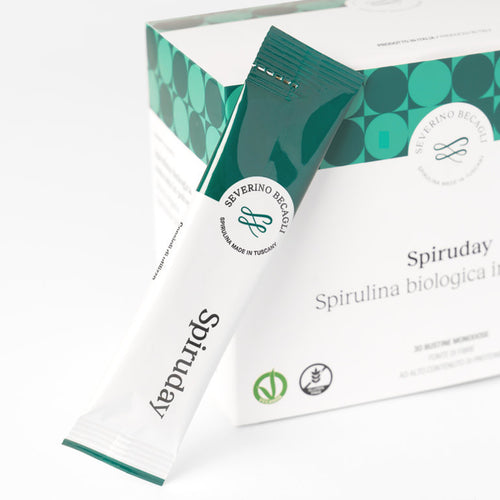Arthrospira platensis, more commonly known as "spirulina", is a green/blue algae characterized by a narrow and elongated shape, no longer than half a millimetre. It is a food rich in properties: vitamins , proteins and other micronutrients, certainly one of the most recommended quality plant foods for eating in a healthy and balanced way, or to be included in the right doses in your daily diet.
In relation to the use of spirulina algae, there are still some beliefs, myths to be debunked which we will see turn out to be totally incorrect, linked for example to the idea that its frequent intake would result in disproportionate weight gain, especially if consumed every day. But what is true in these statements? And what exactly are the properties of spirulina algae?
Let's reflect together on the answer to these questions, first of all trying to understand what algae are and why it is often recommended to take them in the form of a food supplement.
Spirulina: fashion or reality?
The concept of "algae" refers to a plant food with important beneficial properties for the body, capable of providing valid help against diseases and pathologies of various kinds, as we will see better later. There are different varieties of algae, mostly marine and rich in iodine, while spirulina has its own very particular characteristics and nutritional properties, being grown in fresh water and devoid of iodine.
Spirulina algae is still today the protagonist of numerous research in the scientific field, thanks to the presence of vitamins and other important nutritional properties. In reality, many myths have always circulated about spirulina algae, including that relating to a hypothetical harmful effect on patients with thyroid diseases. This is an erroneous belief, which applies to other types of algae but not to spirulina. In fact, it must be taken into account that the latter, unlike other varieties which are not recommended in the case of thyroid disorders, is not a source of significant quantities of iodine, for this reason the research conducted in the field has not highlighted any particular contraindications, it is therefore wrong to support absolute firmness that cannot be assumed in these cases.
Even if there are no clinical studies that have demonstrated its usefulness for treating hypothyroidism, the set of nutrients contained in spirulina algae could even represent additional help in the treatment of these and other thyroid problems, also for preventive measures, although in these cases it is advisable to take it only after obtaining prior medical advice.
This plant product is now constantly talked about, especially since NASA, towards the end of the 1980s, declared that it wanted to give it to astronauts as a source of nutrients.
But what is true about the hypothetical properties of spirulina algae? To answer this question we must necessarily refer to some scientific data, namely the results communicated relatively recently by the French Food Safety Agency (Anses). In fact, their report shows that spirulina algae is an important source of proteins, vitamins (in particular of groups "A" and "E"), essential amino acids and mineral salts, including calcium, potassium, phosphorus , magnesium, zinc and iron.
Another myth to dispel is that relating to the hypothetical uselessness of spirulina as an aid for weight loss; there are even rumors about its ability to facilitate the accumulation of superfluous kg in the body. These are erroneous beliefs: spirulina algae can actually help with body weight loss, as it is capable of accelerating a slow metabolism and thus promoting the disposal of fat.
From research conducted in the sector starting around 30 years ago, it would seem that Spirulina is a source of fundamental nutrients for the well-being and optimal functioning of the body, helping to improve the standard of living of those who take it consistently. In short, an enormous source of beneficial properties, capable of improving the lives of those who take it. Let's see in detail what the effects of spirulina are on the body.
The effects of spirulina on the body
The advantages deriving from taking spirulina algae are so many.
Among its main beneficial effects we find the ability to accelerate the metabolism and consequently promote weight loss , reduce cholesterol levels in the blood and improve blood pressure. As a source of vegetable proteins, as well as beta-carotene, essential fatty acids, chlorophyll, phycocyanin and iron; spirulina would also be able to carry out anti-inflammatory activity in the body, strengthening the immune system and also providing valid help against the prevention of cancer.
Research conducted in the sector has highlighted how the seaweed in question contains important quantities of antioxidants, for this reason it is often associated with the prevention of free radicals, carrying out a preventive action against premature aging of the organism.
Spirulina algae, if taken daily and in correct doses, even helps prevent cardiovascular diseases, thanks to the important quantity of omega-3 and omega-6.
Although it is a natural product and, fundamentally, not harmful to the body, it is advisable to consult your doctor before taking it in case of allergies or intolerances, or in case of autoimmune diseases or other disorders in general, as well as in case of pregnancy and feeding time.
Spirulina supplements
An excellent way to take spirulina daily is to use food supplements, which combined with a healthy and balanced diet help you lose weight and regain your lost figure.
Today, supplements based on spirulina algae are used above all by athletes and those who like to keep fit, taking advantage of the high concentration of vitamins and minerals, as well as its antioxidant properties. If taken before meals, a food supplement based on spirulina algae helps maintain appetite control and promote a sense of satiety, especially thanks to the rich supply of proteins and nutrients. This is why it is recommended for slimming diets, because it helps support the body and lose weight faster, while helping to strengthen the immune system.
Given its remarkable beneficial properties, spirulina can truly be considered the food of the future. But let's see how to integrate it into the diet.
How to include spirulina in your diet
The use of spirulina algae as a food product is very ancient, it would seem that the first use dates back to Roman times.
But how can this product be included in the daily diet of our times? Although it is commonly sold in the form of tablets, spirulina algae can be brought to the table to enrich first and second courses and even as a food coloring, to enhance the taste of dishes and fill up on vitamins (in particular, it can be introduced in your diet in the form of capsules and powdered products, to be added to milk, yogurt or tea).
One of the ways to include spirulina in your diet is to prepare energy smoothies for breakfast, in this case just combine two fruits with a little milk, even vegetable, and a spoonful of dried spirulina to enjoy an energy smoothie and vitaminic. For those who want to start a slimming diet, they can use spirulina to make detox smoothies, just combine vegetables such as spinach or celery with a spoonful of powdered seaweed.
This plant product can also be used as a basic ingredient for making energy bars , simply combine dried fruit, cereals and spirulina powder (a spoonful is enough). A little organic honey can also be added to your liking. If these foods are then combined with natural supplements based on spirulina, the game is done: detoxifying and slimming benefits are combined at the same time.







